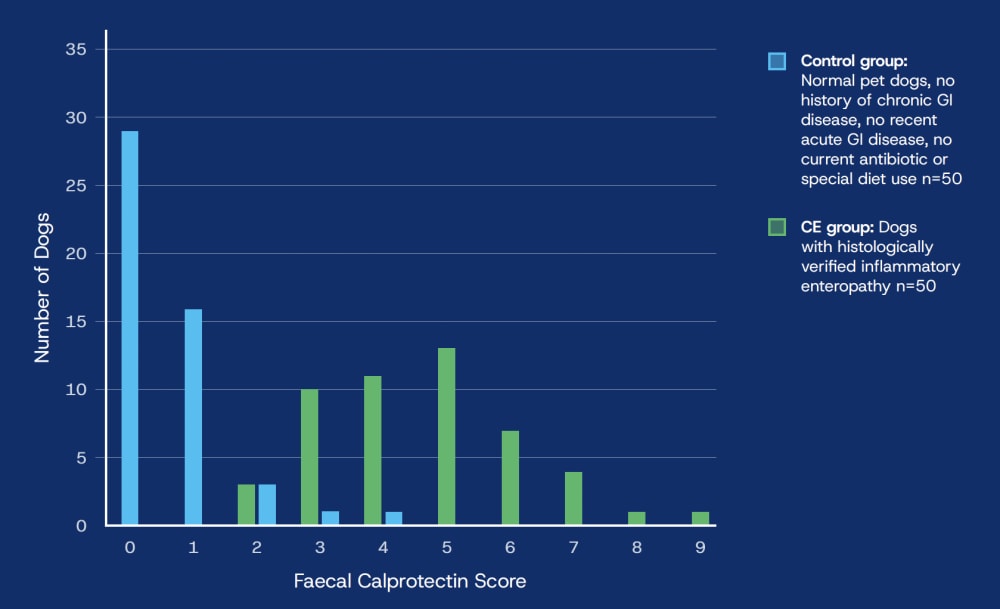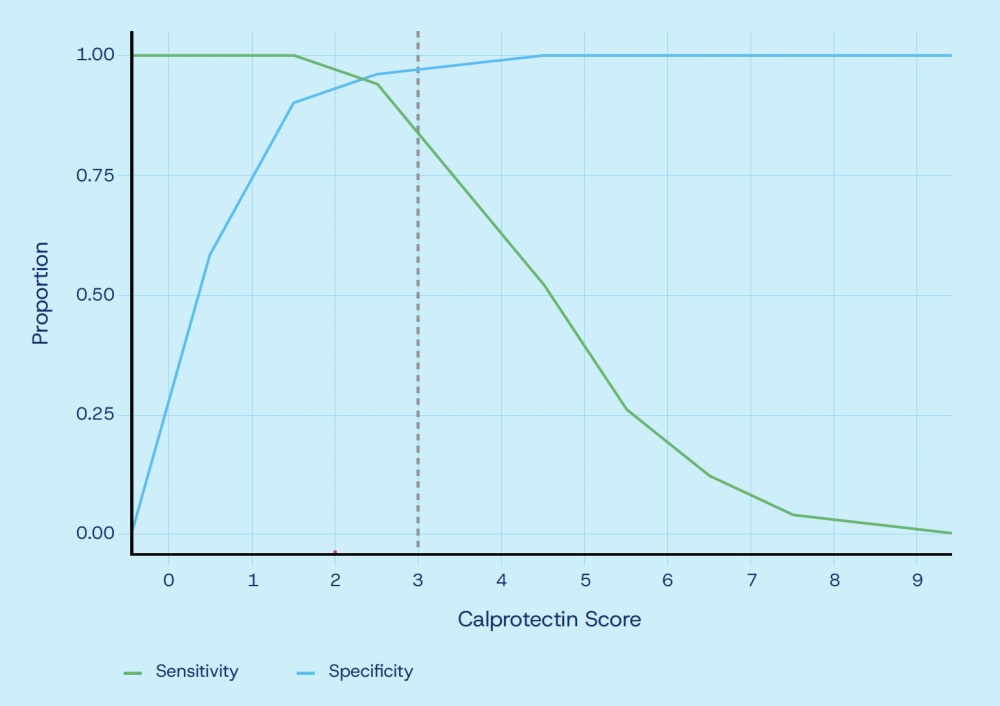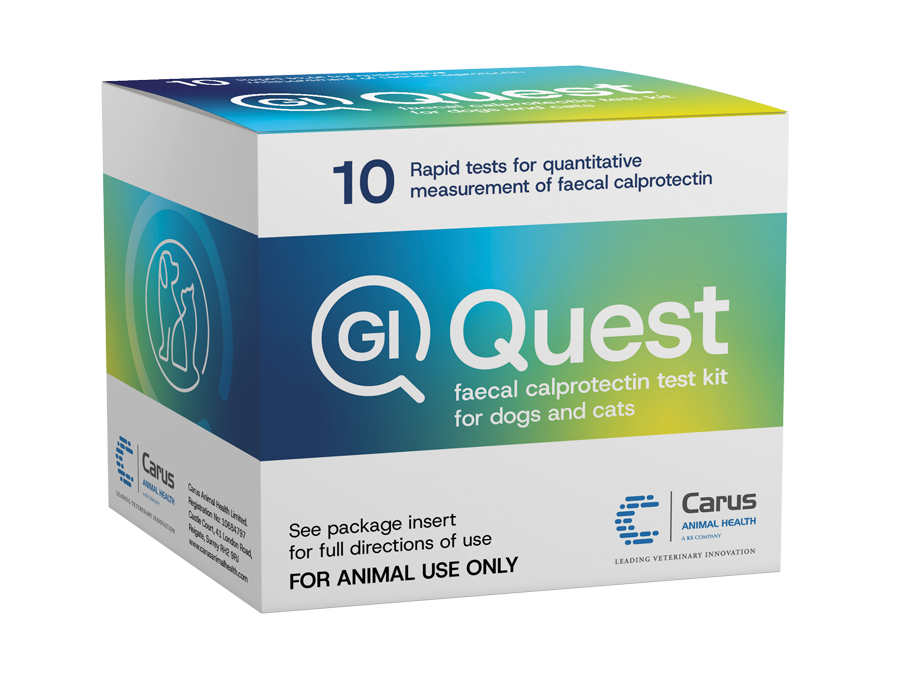Canine studies
Distribution of faecal calprotectin scores in histologically verified inflammatory enteropathy vs controls6
The lateral flow test for faecal calprotectin is highly effective in differentiating dogs with inflammatory enteropathy from healthy dogs.
Comparison of faecal calprotectin scores between dogs with histologically confirmed inflammatory enteropathy and clinically healthy control dogs.
- A Wilcoxon rank-sum test confirms this separation is statistically significant (p < 0.0001), validating the test’s discriminatory ability.
- The distribution of scores shows good separation between the groups.
Interpretation:
- Control dogs cluster around lower calprotectin scores (typically 0–1).
- This result supports the use of the test as a diagnostic aid in identifying CE cases when other causes of intestinal inflammation have been excluded.
CE: Chronic Enteropathy
- Faecal Calprotectin Concentrations in Adult Dogs with Chronic Diarrhoea
- Association of Faecal Calprotectin Concentrations with Disease Severity, Response to Treatment, and Other Biomarkers in Dogs with Chronic Inflammatory Enteropathies
- Faecal Calprotectin Concentrations and Other Indicators in Dogs with Idiopathic Inflammatory Bowel Disease
- Canine Inflammatory Bowel Disease Current and Prospective Biomarkers for Diagnosis and Management
- Serologic and Faecal Markers to Predict Response to Induction Therapy in Dogs with Idiopathic Inflammatory Bowel Disease
Study quick links:
- Canine: Distribution of faecal calprotectin scores in histologically verified inflammatory enteropathy vs controls
- Canine: Sensitivity and Specificity vs Calprotectin Score Threshold in Dogs
- Canine: Food-Responsive Enteropathy – Pre vs Post Diet Trial
- Canine: Dogs Treated with Oral NSAIDs – Pre vs Post Exposure
- Canine: Dogs with Carcinoma – Comparison with Control and Inflammatory Enteropathy Thresholds
- Feline: GIQuest for Feline Chronic Inflammatory Enteropathy
- Feline: Sensitivity and Specificity vs Calprotectin Score Threshold in Cats
Sensitivity and Specificity vs Calprotectin Score Threshold in Dogs6
This study identifies that a threshold of 3 results in specificity of 96% and sensitivity of 94%.
This graph illustrates the trade-off between sensitivity and specificity across calprotectin score thresholds to identify the optimal cut-off using the Youden’s J statistic.
Interpretation:
- A Wilcoxon rank-sum test confirms this separation is statistically significant (p < 0.0001), validating the test’s discriminatory ability.
- A threshold of 3 (equivalent to 3 mg/kg) provides a robust diagnostic cutoff for identifying inflammatory enteropathy.
Study quick links:
- Canine: Distribution of faecal calprotectin scores in histologically verified inflammatory enteropathy vs controls
- Canine: Sensitivity and Specificity vs Calprotectin Score Threshold in Dogs
- Canine: Food-Responsive Enteropathy – Pre vs Post Diet Trial
- Canine: Dogs Treated with Oral NSAIDs – Pre vs Post Exposure
- Canine: Dogs with Carcinoma – Comparison with Control and Inflammatory Enteropathy Thresholds
- Feline: GIQuest for Feline Chronic Inflammatory Enteropathy
- Feline: Sensitivity and Specificity vs Calprotectin Score Threshold in Cats
Food-Responsive Enteropathy – Pre vs Post Diet Trial6
Post-treatment 100% of the dogs had reduced levels of calprotectin, with 75% falling within the normal or borderline range.
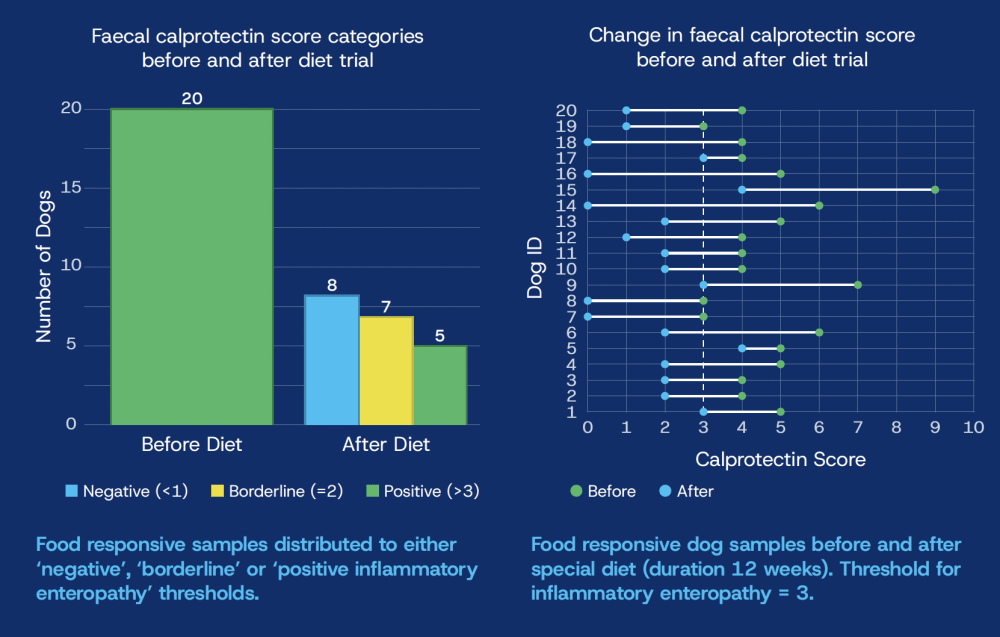
- Pre-treatment, all dogs scored in the inflammatory enteropathy range (≥3mg/kg).
- Pre-diet mean score: 4.7 (95% CI: 4.06–5.34).
- Post-diet mean score: 1.7 (95% CI: 1.13–2.27).
- The decline in calprotectin scores post-diet correlates with clinical improvement, confirming that intestinal inflammation subsides following effective dietary intervention.
- This supports using calprotectin as a biomarker to monitor therapeutic response in dogs with food responsive enteropathy.
Study quick links:
- Canine: Distribution of faecal calprotectin scores in histologically verified inflammatory enteropathy vs controls
- Canine: Sensitivity and Specificity vs Calprotectin Score Threshold in Dogs
- Canine: Food-Responsive Enteropathy – Pre vs Post Diet Trial
- Canine: Dogs Treated with Oral NSAIDs – Pre vs Post Exposure
- Canine: Dogs with Carcinoma – Comparison with Control and Inflammatory Enteropathy Thresholds
- Feline: GIQuest for Feline Chronic Inflammatory Enteropathy
- Feline: Sensitivity and Specificity vs Calprotectin Score Threshold in Cats
Dogs Treated with Oral NSAIDs – Pre vs Post Exposure6
This study confirms that GIQuest can detect NSAID-induced gastrointestinal adverse effects, including in asymptomatic animals.
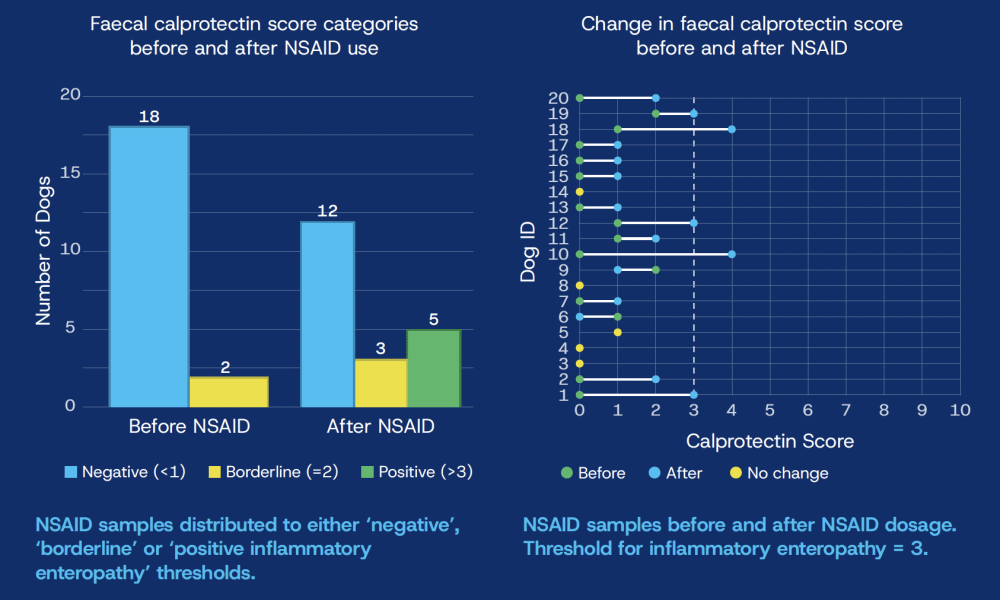
- Pre-NSAID mean score: 0.45 (95% CI: 0.15–0.75).
- Post-NSAID mean score: 1.5 (95% CI: 0.92–2.08).
- 2 dogs already scored ≥2 before NSAID treatment.
- No dogs had a calprotectin score above 3mg/kg before treatment.
- 4 dogs scored above 3 (>3mg/kg) suggestive of adverse GI reaction to NSAID treatment.
- Exposure to NSAIDs is associated with an elevation in faecal calprotectin levels, typically resulting in a moderate increase.
- In a subset of dogs equal to 25%, this rise is consistent with inflammatory enteropathy (a calprotectin score of 3 or above) warranting further monitoring and management of treatment with NSAIDs.
Study quick links:
- Canine: Distribution of faecal calprotectin scores in histologically verified inflammatory enteropathy vs controls
- Canine: Sensitivity and Specificity vs Calprotectin Score Threshold in Dogs
- Canine: Food-Responsive Enteropathy – Pre vs Post Diet Trial
- Canine: Dogs Treated with Oral NSAIDs – Pre vs Post Exposure
- Canine: Dogs with Carcinoma – Comparison with Control and Inflammatory Enteropathy Thresholds
- Feline: GIQuest for Feline Chronic Inflammatory Enteropathy
- Feline: Sensitivity and Specificity vs Calprotectin Score Threshold in Cats
Dogs with Carcinoma – Comparison with Control and Inflammatory Enteropathy Thresholds6
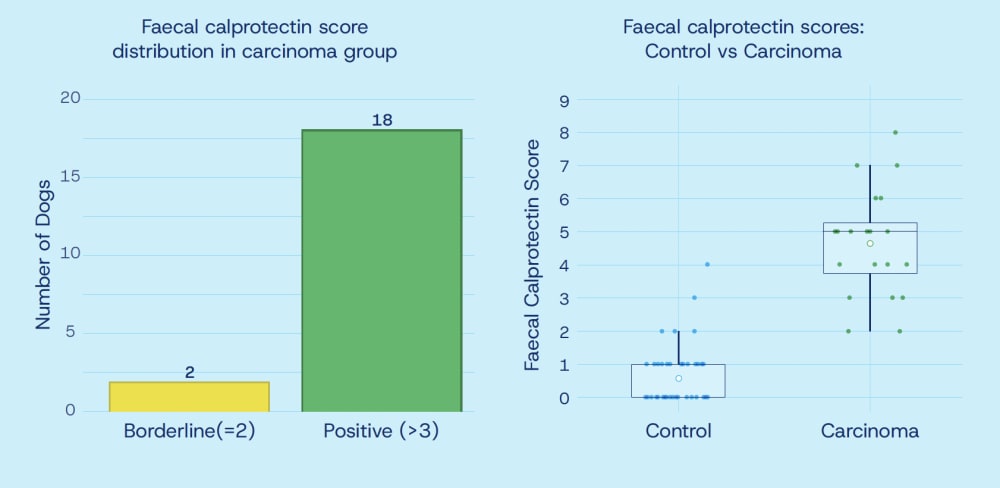
- Dogs with carcinoma have a mean score of 4.7 (95% CI: 3.9–5.4), which overlaps strongly with the intestinal enteropathy group.
- None of the carcinoma samples fall below the ‘borderline’ threshold (score of <2).
- Faecal calprotectin is also elevated in intestinal carcinoma, reflecting active inflammation or mucosal damage.
- Carcinoma cases cannot be distinguished from CE using this test alone; histopathology remains essential for definitive diagnosis.
Study quick links:
- Canine: Distribution of faecal calprotectin scores in histologically verified inflammatory enteropathy vs controls
- Canine: Sensitivity and Specificity vs Calprotectin Score Threshold in Dogs
- Canine: Food-Responsive Enteropathy – Pre vs Post Diet Trial
- Canine: Dogs Treated with Oral NSAIDs – Pre vs Post Exposure
- Canine: Dogs with Carcinoma – Comparison with Control and Inflammatory Enteropathy Thresholds
- Feline: GIQuest for Feline Chronic Inflammatory Enteropathy
- Feline: Sensitivity and Specificity vs Calprotectin Score Threshold in Cats
Feline studies
GIQuest for Feline Chronic Inflammatory Enteropathy6
GIQuest for faecal calprotectin is highly effective in differentiating cats with inflammatory enteropathy from healthy cats.
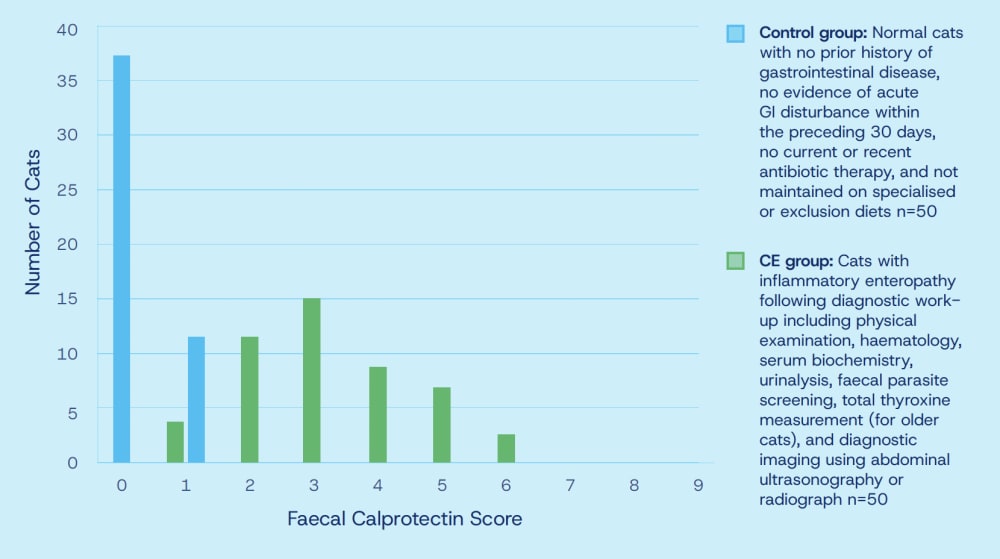
- GIQuest shows excellent diagnostic performance, with an AUC of 0.987 demonstrating high accuracy in discriminating between Chronic Inflammatory Enteropathy (CE) and Control groups.
- CE group were diagnosed by a specialist in feline internal medicine, University of Bristol, after exclusion of other potential causes of enteropathy.
- Control cats cluster around faecal calprotectin scores of 1 or less (≤2mg/kg).
- Scores of 2 or more (≥2.5mg/kg) occur with inflammatory enteropathy.
- This result supports the use of the test as a diagnostic aid in identifying CE cases.
Study quick links:
- Canine: Distribution of faecal calprotectin scores in histologically verified inflammatory enteropathy vs controls
- Canine: Sensitivity and Specificity vs Calprotectin Score Threshold in Dogs
- Canine: Food-Responsive Enteropathy – Pre vs Post Diet Trial
- Canine: Dogs Treated with Oral NSAIDs – Pre vs Post Exposure
- Canine: Dogs with Carcinoma – Comparison with Control and Inflammatory Enteropathy Thresholds
- Feline: GIQuest for Feline Chronic Inflammatory Enteropathy
- Feline: Sensitivity and Specificity vs Calprotectin Score Threshold in Cats
Sensitivity and Specificity vs Calprotectin Score Threshold in Cats6
At a threshold score of 2 (equivalent to 2.5 mg/kg), the test demonstrated 92% sensitivity and 100% specificity.
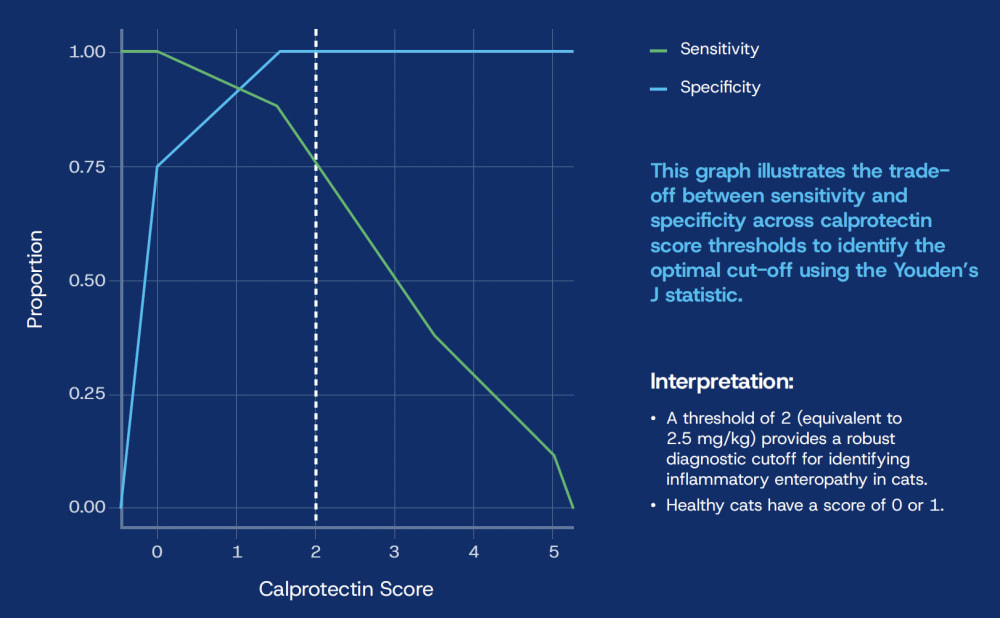
Join the reveal-ution
Register to learn more about GIQuest and get support from our team.
Available to purchase with NVS, Covetrus and MWI

